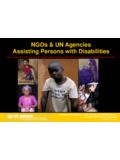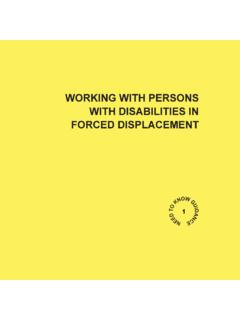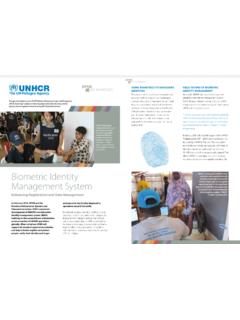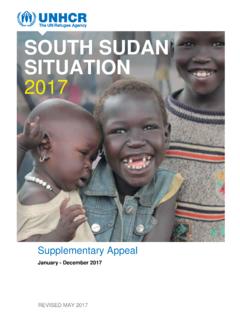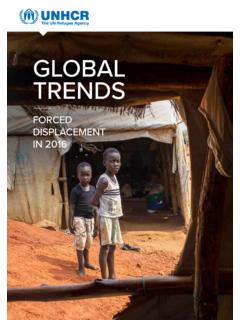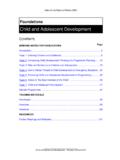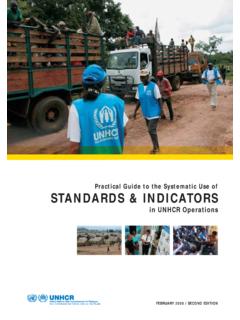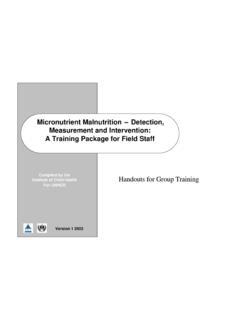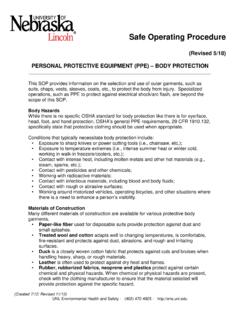Transcription of Article 31 of the 1951 Convention relating to the Status ...
1 Article 31 of the 1951 Convention relating to the Status of Refugees:Non-penalization, Detention and ProtectionGuy S. Goodwin-GillProfessor of International Refugee LawUniversity of OxfordMember of the English BarA paper prepared at the request of the Department of International Protection for the UNHCRG lobal ConsultationsOctober 2001 Table of Contents1. Article 31: Refugees unlawfully in the country of Problems arising and scope of the Article 31: The Origins of the The Ad hoc Discussions at the 1951 The meaning of terms: Some preliminary Incorporation of the principle in national National States of case illustrations of State .. and recommendations of the UNHCR Executive Committee Conclusion No. 15 (XXX) Committee Conclusion No. 58 (XL) International Standards and State and tentative conclusions regarding Article 31(1).
2 On freedom of movement under Article 31(2), including scope of protection under CSR51 and development of international or adoption of standards in national and tentative conclusions on the detention of refugees and Article 31: Refugees unlawfully in the country of 31 of the 1951 Convention relating to the Status of Refugees provides asfollows:1. The Contracting States shall not impose penalties, onaccount of their illegal entry or presence, on refugeeswho, coming directly from a territory where their life orfreedom was threatened in the sense of Article 1, enter orare present in their territory without authorization,provided they present themselves without delay to theauthorities and show good cause for their illegal entry The Contracting States shall not apply to themovements of such refugees restrictions other than thosewhich are necessary and such restrictions shall only beapplied until their Status in the country is regularized orthey obtain admission into another country.
3 TheContracting States shall allow such refugees a reasonableperiod and all the necessary facilities to obtain admissioninto another this provision, asylum seekers are placed in detention facilitiesthroughout Europe, North America, and Australia, owing to their illegal entry orpresence. In its July 2000 review of reception standards for asylum seekers in theEuropean Union, UNHCR found several different types of detention inoperation, including detention at border points or in airport transit areas, and thatthe grounds for detention also vary. For example, refugees and asylum seekersmay be detained at the pre-admission phase, because of false documents or lackof proper documentation, or they may be held in anticipation of deportation ortransfer to a safe third country , for example, under the provisions of the DublinConvention.
4 Several countries have no limit on the maximum period ofdetention, including Denmark, Finland, Greece, the Netherlands and the UnitedKingdom, while others provide maximum periods and require release if nodecision on admission or removal has been taken. , the practice among receiving countries is to set up special detentionor holding centres, for example, in Austria, Belgium, Denmark, France,Germany, Greece, the Netherlands, Spain, Sweden, the United Kingdom, and theUnited States; such facilities may be open, semi-open or closed. Because ofArticle 31 of the 1951 Convention2 1 This duty is recognized in Article 2(1) of the 1966 Covenant on Civil and Political Rights ( EachState Party .. undertakes to respect and to ensure to all individuals within its territory and subject to itsjurisdiction the rights recognized in the present ), in Article 1 of the 1950 European Convention ( Parties shall secure to everyone within their jurisdiction the rights and freedoms defined in Section1 of this Convention ), and in Article 1 of the 1969 American Convention ( Parties undertake torespect the rights and freedoms recognized herein and to ensure to all persons subject to their jurisdiction(their) free and full ).
5 It is clearly linked to the matching duty to provide a remedy to thosewhose rights are infringed, or threatened with violation (Art. 14(1), 1966 Covenant on Civil and PoliticalRights; art. 13, 1950 European Convention on Human Rights; art. 25, 1969 American Convention onHuman Rights).demand, many States also employ regular jails for the purposes of immigration-related detention; in such cases, asylum seekers are generally subject to the sameregime as other prisoners and are not segregated from criminals or 1951 Convention establishes a regime of rights and responsibilities forrefugees. In most cases, only if an individual s claim to refugee Status isexamined before he or she is affected by an exercise of State jurisdiction (forexample, in regard to penalization for illegal entry), can the State be sure thatits international obligations are met.
6 Just as a decision on the merits of a claimto refugee Status is generally the only way to ensure that the obligation of non-refoulement is observed, so also is such a decision essential to ensure thatpenalties are not imposed on refugees, contrary to Article 31 of the impose penalties without regard to the merits of an individual s claim to bea refugee will likely also violate the obligation of the State to ensure and toprotect the human rights of everyone within its territory or subject to a practice is also wasteful of national resources and an example of badmanagement. Where the penalty imposed is detention, it imposes significantcosts on the receiving State, and inevitably increases delay in national systems,whether at the level of refugee determination or immigration control.
7 , increasing demands for control measures over the movements ofpeople have led even to refugees recognized after unauthorised arrival beingaccorded lesser rights, contrary to the terms of the 1951 Convention /1967 Protocol, while elsewhere refugees and asylum seekers are commonly fined 31 of the 1951 Convention3 2 Art. 31(1), 1969 Vienna Convention on the Law of Treaties: UN doc. ; Goodwin-Gill, , The Refugee in International Law, Clarendon Press, Oxford, 2nd ed., 1996, Problems arising and scope of the this time of uncertainty, when security concerns are once more high on theagenda and many States seem unable effectively to manage their refugeedetermination systems effectively and efficaciously, the terms of Article 31 ofthe 1951 Convention call for close examination and analysis.
8 Parts 2 5 of thispaper therefore review the central issues arising out of Article 31(1), withparticular reference to the scope of protection (who benefits), the conditions ofentitlement ( coming directly , without delay , good cause ), and the precisenature of the immunity ( penalties ). Part 6 examines Article 31(2), withparticular reference to restrictions of freedom of movement and the issue ofdetention (both generally, and in regard to the necessary measures which maybe imposed under that Article 31: The Origins of the Vienna Convention on the Law of Treaties confirms the principle of generalinternational law, that a treaty shall be interpreted in good faith in accordancewith the ordinary meaning to be given to the terms of the treaty in the contextand in the light of its object and purpose.)
9 2 In the case of the 1951 Convention ,this means interpretation by reference to the object and purpose of extending theprotection of the international community to refugees, and assuring to refugeesthe widest possible exercise fundamental rights and freedoms . ( 1951 Convention , Preamble.) 32 of the 1969 Vienna Convention on the Law of Treaties providesfurther that, Recourse may be had to supplementary means ofinterpretation, including the preparatory work of thetreaty and the circumstances of its conclusion, in order toconfirm the meaning resulting from the application ofarticle 31, or to determine the meaning when theinterpretation according to Article 31: (a) leaves themeaning ambiguous or obscure; or (b) leads to a resultwhich is manifestly absurd or 31 of the 1951 Convention4 3 Belgium and the United States of America: Proposed Text for Article 24 of the Draft Conventionrelating to the Status of Refugees: UN doc.
10 , 2 Feb. 1950; Decisions of the Committee onStatelessness and Related Problems taken at the meetings of 2 February 1950: UN doc. , 2 February 1950. 4 Decisions of the Committee on Statelessness and Related Problems taken at the meetings of 3 February 1950: UN doc. , 3 February is shown below, the travaux pr paratoires confirm the ordinary meaning of Article 31(1) of the 1951 Convention , which applies to refugees who enter orare present without authorization, whether they have come directly from theircountry of origin, or from any other territory in which their life or freedom wasthreatened, provided they show good cause for such entry or far as the references in Article 31(1) to refugees who come directly andshow good cause may be ambiguous, the travaux pr paratoires illustrate thatthese terms were not intended to deny protection to persons in analogoussituations.

